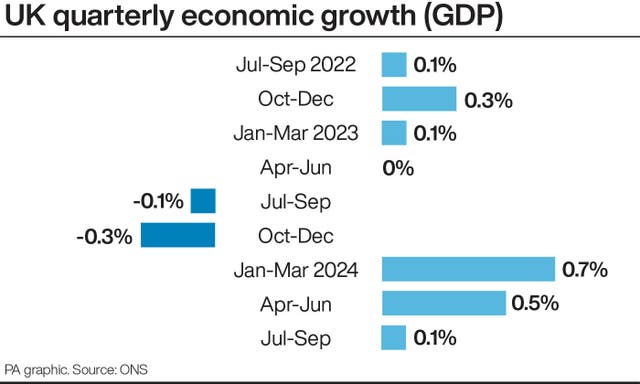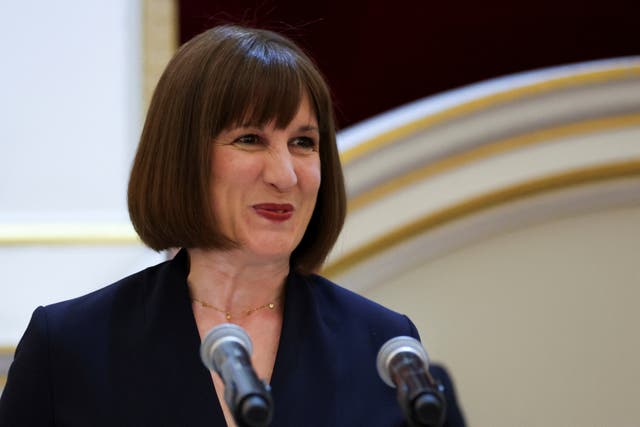Chancellor Rachel Reeves has said she is “not satisfied” after official figures showed that economic growth slowed in the months after Labour won the election, and even contracted in September.
The UK economy grew by 0.1% between July and September, versus 0.5% growth in the previous quarter, the Office for National Statistics (ONS) said.
The estimate was behind economists’ predictions of 0.2% and covers the months before the Budget in October, in which Labour unveiled a rise in spending and business taxes.
It comes as a blow to Labour, which has made growth a key part of its pitch to the general public, a strategy which helped the party win by a landslide in July.
Ms Reeves said: “Improving economic growth is at the heart of everything I am seeking to achieve, which is why I am not satisfied with these numbers.”

Speaking to reporters on Friday, Ms Reeves added that she wanted growth to “be stronger, to come sooner, and also to be felt by families right across the country”.
Liz McKeown, ONS director of economic statistics, said some sectors like retail and construction performed well, but added: “Generally, growth was subdued across most industries in the latest quarter.”
The economy is estimated to have contracted by 0.1% in September. Several experts said the slowdown could have been down to companies holding back on spending decisions until after the Budget.
GDP grew 0.1% in Quarter 3 (July to Sept) 2024.
Services grew 0.1%, construction grew 0.8% while production fell by 0.2%.
Read more ➡️ https://t.co/6divrYqXmA pic.twitter.com/UeanOLqwcE
— Office for National Statistics (ONS) (@ONS) November 15, 2024
In the run-up, Ms Reeves repeatedly warned that the Budget would contain “tough choices”. The statement itself, in which Labour announced a rise in employer taxes to help fund a boost in public spending, came after the period covered by these figures.
Ben Jones, lead economist at the Confederation of British Industry (CBI), said uncertainty ahead of the Budget “probably played a big part”, after firms reported a slowdown in making spending decisions.
The services sector, which makes up the bulk of the economy, was flat in September, and grew by just 0.1% during the three-month period.
Factory output fell 0.2% over the quarter, driven by a larger decline in the month of September, while the construction sector grew 0.8% over the quarter.
Shadow chancellor Mel Stride blamed the Government for talking down the economy after winning the election, and said it was “reaping, to a degree, what they’ve done”. Mr Stride also pointed out that the Government had followed up with a Budget that ramped up taxes which “are going to bear down on growth”.

Labour’s public spending increases, which amount to roughly £70 billion per year, according to the Office for Budget Responsibility, are projected to boost economic growth over the next two years, relative to previous forecasts.
Sanjay Raja, chief UK economist at Deutsche Bank, said: “The road ahead remains bumpy.”
He warned that the tax rises could hit business spending further before Labour’s spending plans start having a positive impact early next year.
“We see growth picking up a touch towards year-end. And we still see positive momentum into 2025,” he said.
“But downside risks are brewing. Geopolitical risks are on the rise with the spectre of a trade war looming.”

The GDP figures also follow Bank of England policymakers’ decision to cut interest rates by a quarter point to 4.75% in early November, with another rates decision coming in December.
Suren Thiru, economics director at the Institute of Chartered Accountants in England and Wales, said that despite the “downbeat” figures, another rate cut next month looks “improbable”.

He said rate-setters will “likely be concerned enough over inflation risks from the Budget and growing global headwinds to resist signing off back-to-back interest rate cuts”.
The Bank has also forecast that the extra public spending will boost economic growth by 0.75 percentage points at its peak in a year’s time, relative to previous forecasts published in August.




Why are you making commenting on The National only available to subscribers?
We know there are thousands of National readers who want to debate, argue and go back and forth in the comments section of our stories. We’ve got the most informed readers in Scotland, asking each other the big questions about the future of our country.
Unfortunately, though, these important debates are being spoiled by a vocal minority of trolls who aren’t really interested in the issues, try to derail the conversations, register under fake names, and post vile abuse.
So that’s why we’ve decided to make the ability to comment only available to our paying subscribers. That way, all the trolls who post abuse on our website will have to pay if they want to join the debate – and risk a permanent ban from the account that they subscribe with.
The conversation will go back to what it should be about – people who care passionately about the issues, but disagree constructively on what we should do about them. Let’s get that debate started!
Callum Baird, Editor of The National
Comments: Our rules
We want our comments to be a lively and valuable part of our community - a place where readers can debate and engage with the most important local issues. The ability to comment on our stories is a privilege, not a right, however, and that privilege may be withdrawn if it is abused or misused.
Please report any comments that break our rules.
Read the rules hereLast Updated:
Report this comment Cancel